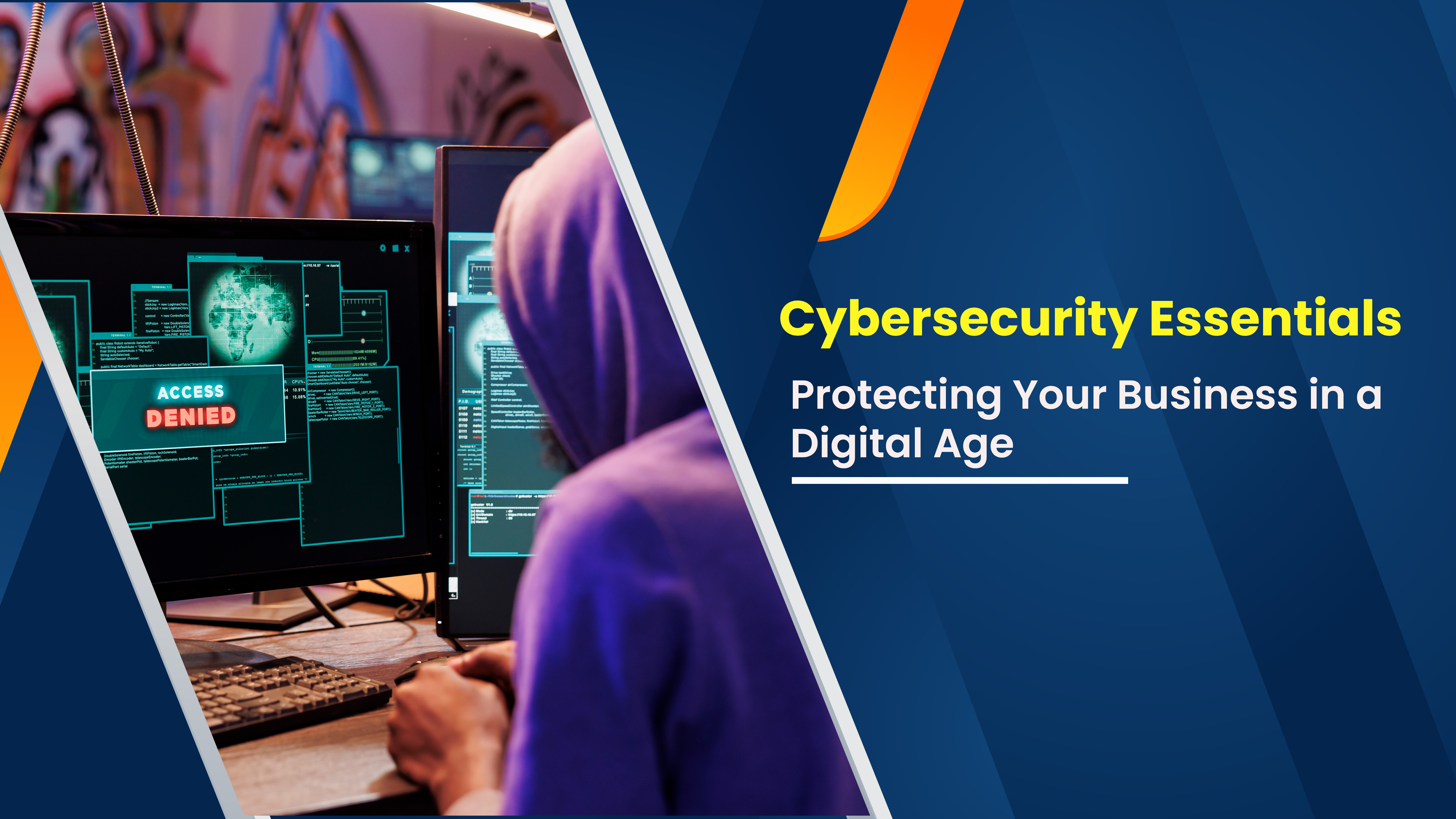Cybersecurity Essentials: Protecting Your Business in a Digital Age

The digital age has revolutionized the way businesses operate. From cloud computing and e-commerce to remote workforces and interconnected networks, technology has become an indispensable part of our daily business lives. However, this increased reliance on technology also introduces a new set of vulnerabilities: cyberattacks.
Cybersecurity is no longer a matter of convenience; it's the lifeblood of your business. In a world where data is the new currency, a cyberattack can be a devastating blow, hemorrhaging sensitive information, disrupting operations, and eroding customer trust. By prioritizing cybersecurity, you're not just safeguarding your data; you're investing in the very foundation of your business. Empower your workforce with the knowledge and tools they need to be vigilant against cyber threats and embrace a proactive approach that goes beyond reactive measures. By building a robust defense system, fostering a culture of security awareness, and staying informed about the latest threats, you can transform your business from a vulnerable target to a fortress of resilience. In the ever-evolving digital landscape, cybersecurity is not a one-time fix; it's an ongoing commitment to safeguarding your business and ensuring its continued success.
Cybercriminals are constantly evolving their tactics, targeting businesses of all sizes with sophisticated malware, phishing scams, and data breaches. The potential consequences of a cyberattack can be devastating, leading to financial losses, reputational damage, and operational disruptions.
Here, we delve into the essential cybersecurity practices that every business, regardless of size or industry, needs to implement to safeguard its digital assets and ensure business continuity.
Building a Robust Defense System:
Firewalls: The first line of defense in your cybersecurity strategy is a robust firewall. This software or hardware appliance acts as a barrier, filtering incoming and outgoing traffic based on predetermined security rules. Firewalls can help prevent unauthorized access to your network and protect against malicious attacks.
Antivirus and Anti-Malware Software: Every device connected to your network should be equipped with up-to-date antivirus and anti-malware software. These programs continuously scan your systems for malicious code and prevent them from infecting your devices and compromising your data. Regular updates are crucial to maintain optimal protection against the latest threats.
Data Encryption: Sensitive data, like customer information and financial records, should be encrypted at rest and in transit. Encryption scrambles data using a secret key, rendering it unreadable to anyone who doesn't possess the key. This significantly reduces the risk of data breaches even if cybercriminals gain access to your systems.
Strong Password Management: Weak passwords are a major security vulnerability. Enforce strong password policies within your organization, requiring employees to use complex passwords with a combination of uppercase and lowercase letters, numbers, and symbols. Implementing multi-factor authentication (MFA) adds an extra layer of security by requiring a second verification step beyond just a password.
Vulnerability Management: Regularly update your operating systems, software applications, and firmware to address known vulnerabilities. Cybercriminals often exploit security flaws in outdated software to gain access to systems. Patch management systems can automate this process, ensuring your systems are always protected with the latest security updates.
Securing Your Network and Devices:
Network Segmentation: Dividing your network into smaller segments can limit the potential damage caused by a cyberattack. Segmenting your network isolates critical systems from less sensitive areas, making it more difficult for attackers to move laterally within your network environment.
Secure Remote Access: With the rise of remote workforces, securing remote access points is crucial. Implement secure protocols like Virtual Private Networks (VPNs) to encrypt data traveling between remote devices and your network. Additionally, consider multi-factor authentication for remote logins to enhance security.
Mobile Device Management (MDM): If your employees use mobile devices for work purposes, a Mobile Device Management (MDM) solution is essential. MDM allows you to centrally manage and secure these devices, enforce security policies, and remotely wipe data if a device is lost or stolen.
Employee Training and Awareness: One of the most effective defenses against cyberattacks is a vigilant workforce. Regularly train your employees on cybersecurity best practices, including phishing email identification, password hygiene, and safe browsing habits. Employees should be aware of the latest cyber threats and understand their role in protecting company data.
Developing a Comprehensive Incident Response Plan:
Despite your best efforts, cyberattacks can still occur. Having a well-defined incident response plan in place helps you mitigate the damage and recover quickly in the event of a security breach. The plan should outline the steps to take upon detecting a breach, including containing the threat, notifying the appropriate authorities, and restoring compromised systems. Regularly review and update your incident response plan to ensure its effectiveness.
Staying Informed and Proactive:
Cybersecurity News and Updates: Keeping yourself informed about the latest cyber threats and trends is essential. Subscribe to reputable cybersecurity news sources and industry publications to stay updated on emerging threats and mitigation strategies.
Penetration Testing and Vulnerability Assessments: Regularly conduct penetration testing and vulnerability assessments on your systems. These assessments identify potential security weaknesses that attackers can exploit. By proactively identifying and addressing these vulnerabilities, you can significantly reduce your risk of a cyberattack.
Cybersecurity Insurance: Consider cyber insurance to help offset the financial losses incurred in the event of a cyberattack. Cyber insurance can cover costs associated with data recovery, business interruption, and legal defense.
Conclusion: The digital landscape offers immense opportunities for businesses, but it also comes with inherent risks. By prioritizing cybersecurity and adopting a comprehensive approach, you can transform your business from a vulnerable target to a fortress of resilience. Remember, cybersecurity is not just an IT concern; it's a business imperative. By building strong defenses, educating your workforce, and staying proactive, you can safeguard your valuable data, protect your reputation, and ensure the continued success of your organization in the ever-evolving digital age. The future of business is secure, and it starts with prioritizing cybersecurity essentials today.
